Introduction
Navigating the business landscape requires a keen understanding of various strategic options available for leveraging intellectual property and expanding operations. Licensing and franchising present two distinct pathways, each with its unique advantages, challenges, and legal considerations. While both mechanisms allow for the use of another party’s intellectual property, they differ significantly in terms of scope, control, and financial commitments.
Licensing typically involves granting rights to specific intellectual properties, enabling businesses to utilize patents, trademarks, or technologies with limited oversight and support from the licensor. Franchising, however, encompasses a broader agreement where franchisees replicate an entire business model, benefiting from extensive support systems, brand recognition, and economies of scale.
Understanding the nuances between licensing and franchising is crucial for entrepreneurs and business owners aiming to make informed decisions. This article will delve into the key differences between these two approaches, exploring their respective scopes, control mechanisms, financial arrangements, regulatory frameworks, and the associated pros and cons. By examining these facets, individuals can better evaluate which model aligns with their goals, resources, and desired level of operational autonomy, ultimately guiding them towards a strategic and successful business venture.
Definitions and Key Differences
Licensing and franchising are both agreements that enable one party to use another’s intellectual property, but they differ significantly in scope and application. Licensing typically grants permission to use specific intellectual property, such as patents, trademarks, or technology. This arrangement allows the licensee to leverage the licensor’s intellectual property without adopting its business model.
Franchising, however, goes beyond merely licensing intellectual property. A franchise agreement allows a franchisee to replicate an entire business model, encompassing branding, processes, and operational systems. This comprehensive approach includes the use of the trademark owner’s trademarks, service marks, logos, and other branding elements. The franchise acquires the authority to run a business using the established brand and business practices of the brand owner, as long as they comply with certain conditions.
One of the key advantages of franchising is the collaborative nature of the business network. Franchisees benefit from the franchisor’s continuous investment in research and development, ensuring that they remain at the forefront of market trends and industry innovations. This collective effort involves the ongoing enhancement of products, services, and operational processes, enabling the entire network to stay competitive and responsive to changing consumer preferences. Additionally, franchisees gain access to new technologies and practices, helping them deliver the latest and most efficient solutions to their customers.
Moreover, business networks often enjoy significant economies of scale. Due to their size, they can achieve substantial cost savings through bulk purchasing, centralized operations, and shared resources. These cost advantages contribute to the overall consistency and quality of the franchise brand across different locations, enhancing operational efficiency and ensuring a uniform customer experience.
In summary, while licensing concentrates on providing rights to particular intellectual property, the broader agreement enables franchisees to duplicate a complete business model, benefiting from the continuous innovation and economies of scale of the brand owner.
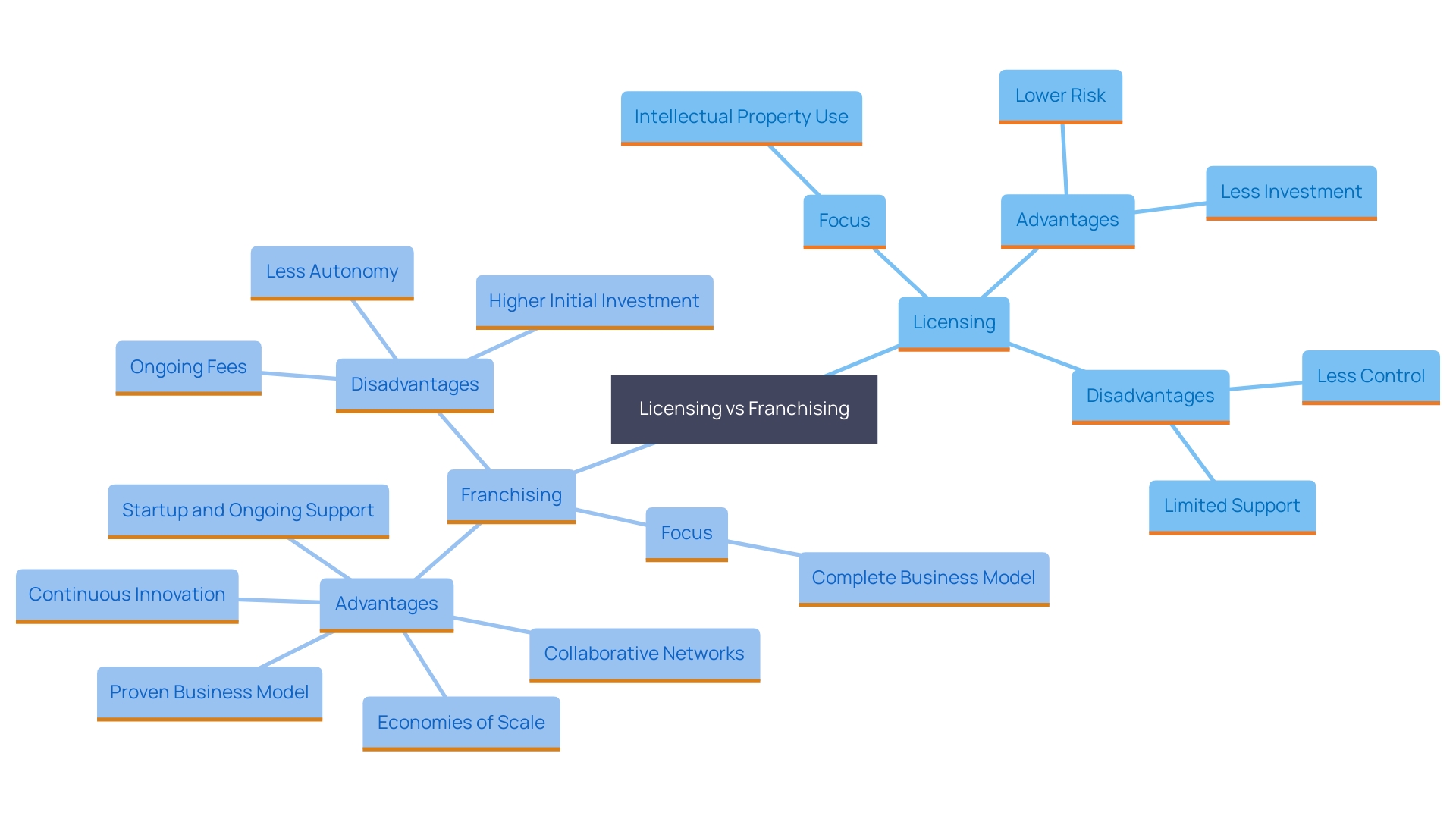
Scope of Agreement
Licensing agreements are generally limited to specific intellectual properties, allowing the licensee to use these assets under certain conditions. For example, a license might grant permission to use a patented technology or trademark. In contrast, franchising agreements encompass a complete business system. This signifies that the entity granting the franchise permits the franchisee not only the right to utilize the intellectual property but also the operational systems and identity. The franchisee obtains the rights to run a business under the franchisor’s name, adhering to detailed guidelines. In the U.S., these agreements are heavily regulated by the FTC, requiring a Franchise Disclosure Document to be provided at least 14 days before any binding contract.
Control and Support
In licensing arrangements, the licensor typically exerts limited control over the licensee’s business practices and offers minimal support. Conversely, franchisors maintain a high level of control over the franchisee’s operations. This control is reflected in the comprehensive training programs, marketing materials, and ongoing support provided to ensure consistency of the identity. For instance, Slim Chickens has demonstrated how fostering relationships on multiple levels and aligning training with organizational goals can lead to higher quality standards and performance across franchises. By developing and adhering to a robust system, franchisors can ensure their identity remains strong and unified, much like the successful implementation seen in the Slim Chickens chain.
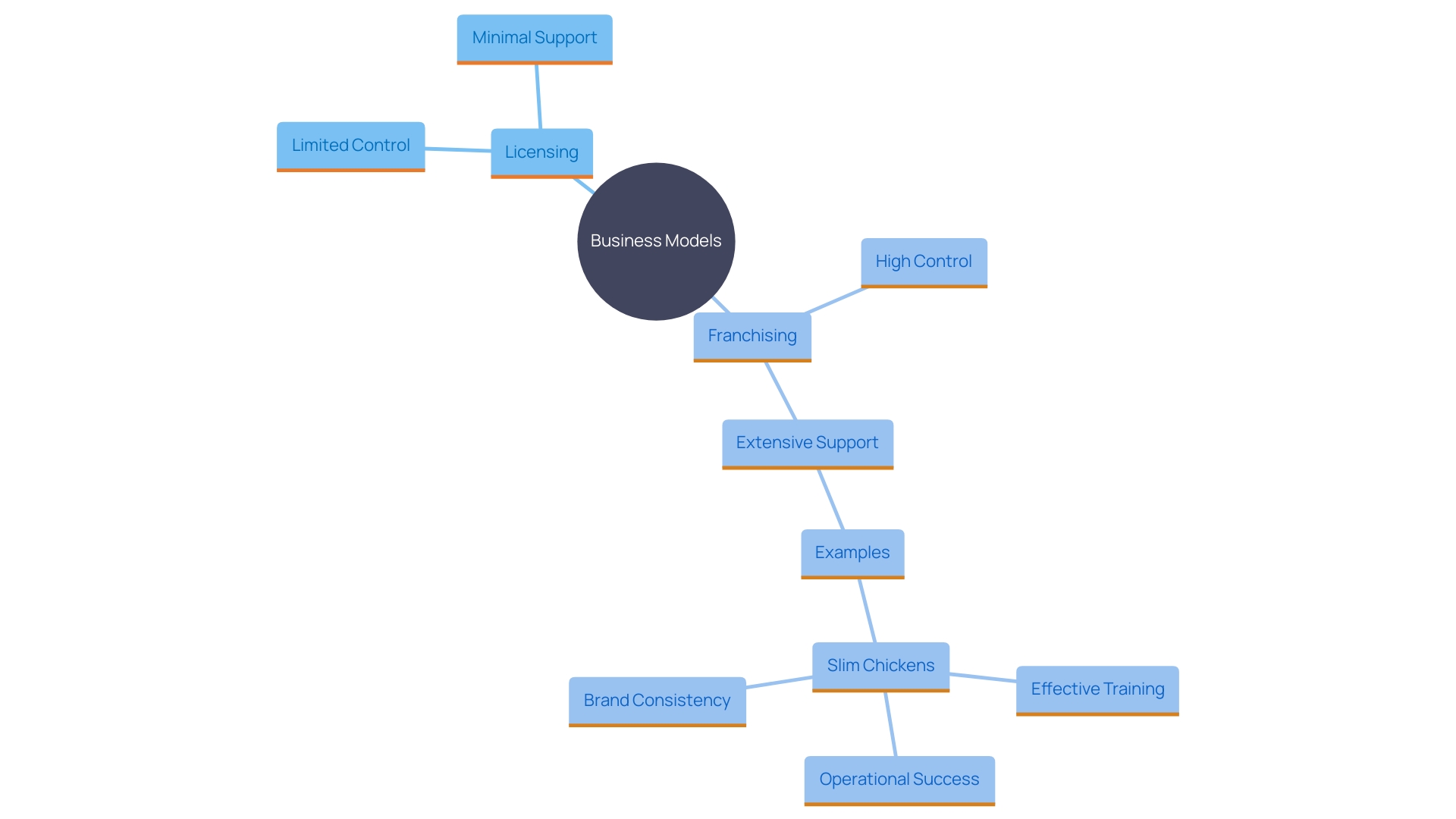
Financial Arrangements
Licensing generally involves lower initial costs, with the licensee paying royalties based on sales or a flat fee. According to the 2024 Global Licensing Industry Study, the licensing industry showed significant growth, reaching $356.5 billion in sales in 2023. This growth was largely driven by strong brands and the expansion of services and location-based entertainment sectors. However, licensing often necessitates a significant initial investment, which encompasses licensing fees, equipment acquisitions, and continuous royalty payments that may be a portion of revenue.
Franchises must adhere to stringent regulations, such as the Federal Trade Commission’s Franchise Rule in the United States, which mandates detailed disclosures to prospective franchisees. This includes providing a Franchise Disclosure Document (FDD) at least 14 days before entering a binding contract, allowing time for legal review. The FDD contains critical information about the franchise owner’s background, financial performance, and the legal obligations of both parties.
Additionally, a business contract is a detailed legal document that specifies the rights and responsibilities of the brand owner and the business operator. It encompasses the franchisor permitting their intellectual property, systems, and identity to the franchisee, who, in return, acquires the authority to run a business under the franchisor’s established framework. The initial and ongoing expenses of operating a franchise can differ greatly among brands, making it essential for prospective franchisees to thoroughly assess and contrast various franchise options to make a well-informed choice.
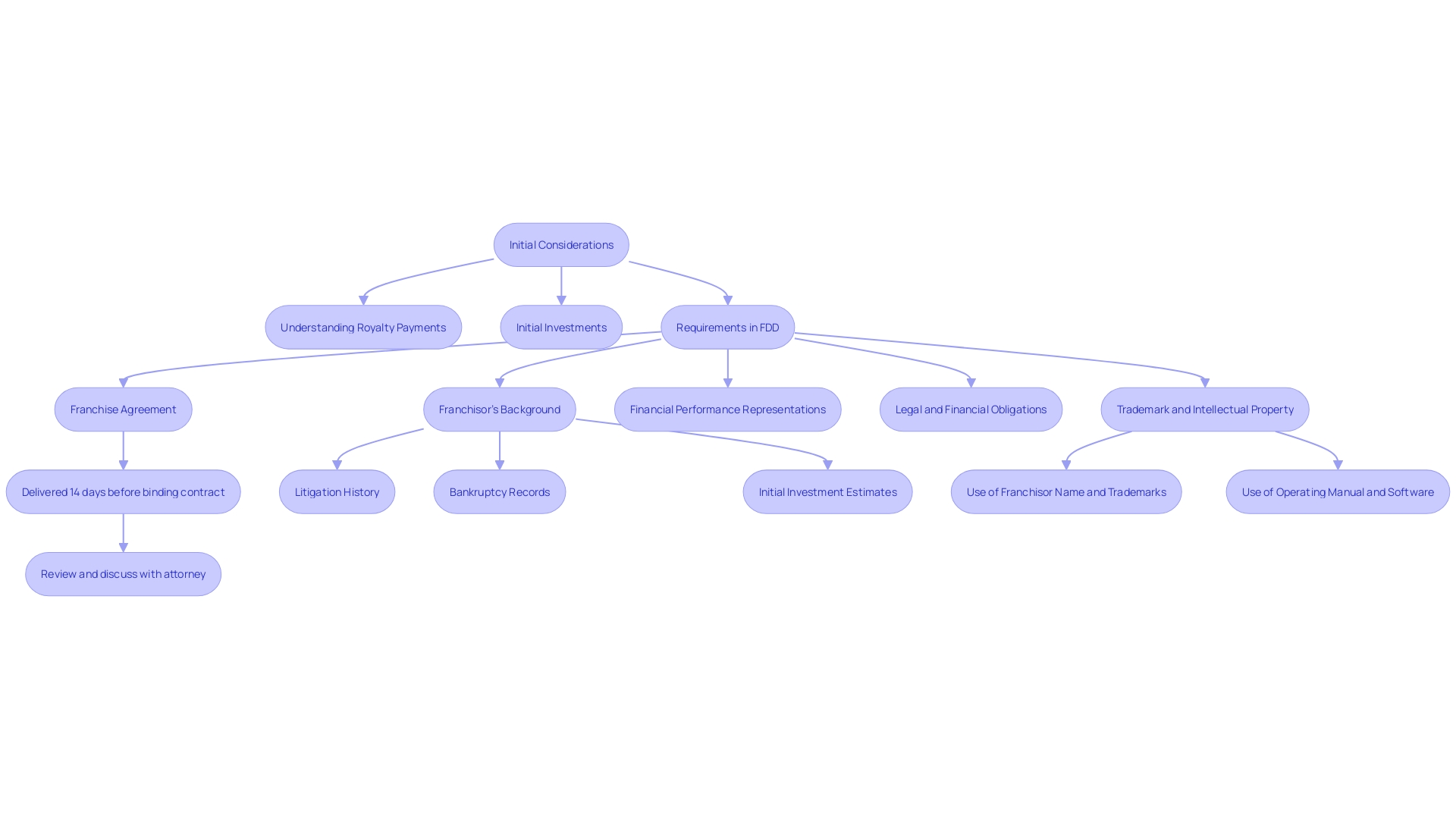
Legal and Regulatory Considerations
Licensing agreements are generally subject to less regulation, primarily governed by contract law. This means that the terms are mostly determined by the parties involved, making it a more straightforward process. On the other hand, the practice of granting franchises is heavily regulated, particularly in the United States, where the Federal Trade Commission (FTC) Franchise Rule imposes strict disclosure requirements. Franchisors must provide prospective franchisees with a Franchise Disclosure Document (FDD), which includes essential information such as the franchisor’s litigation history, bankruptcy records, and initial investment estimates. This comprehensive document is crucial for prospective franchisees to make informed decisions. Additionally, the FDD must be delivered at least 14 days before signing any binding contract, allowing time for review and legal consultation. This regulatory framework ensures transparency and protects the interests of both parties involved.
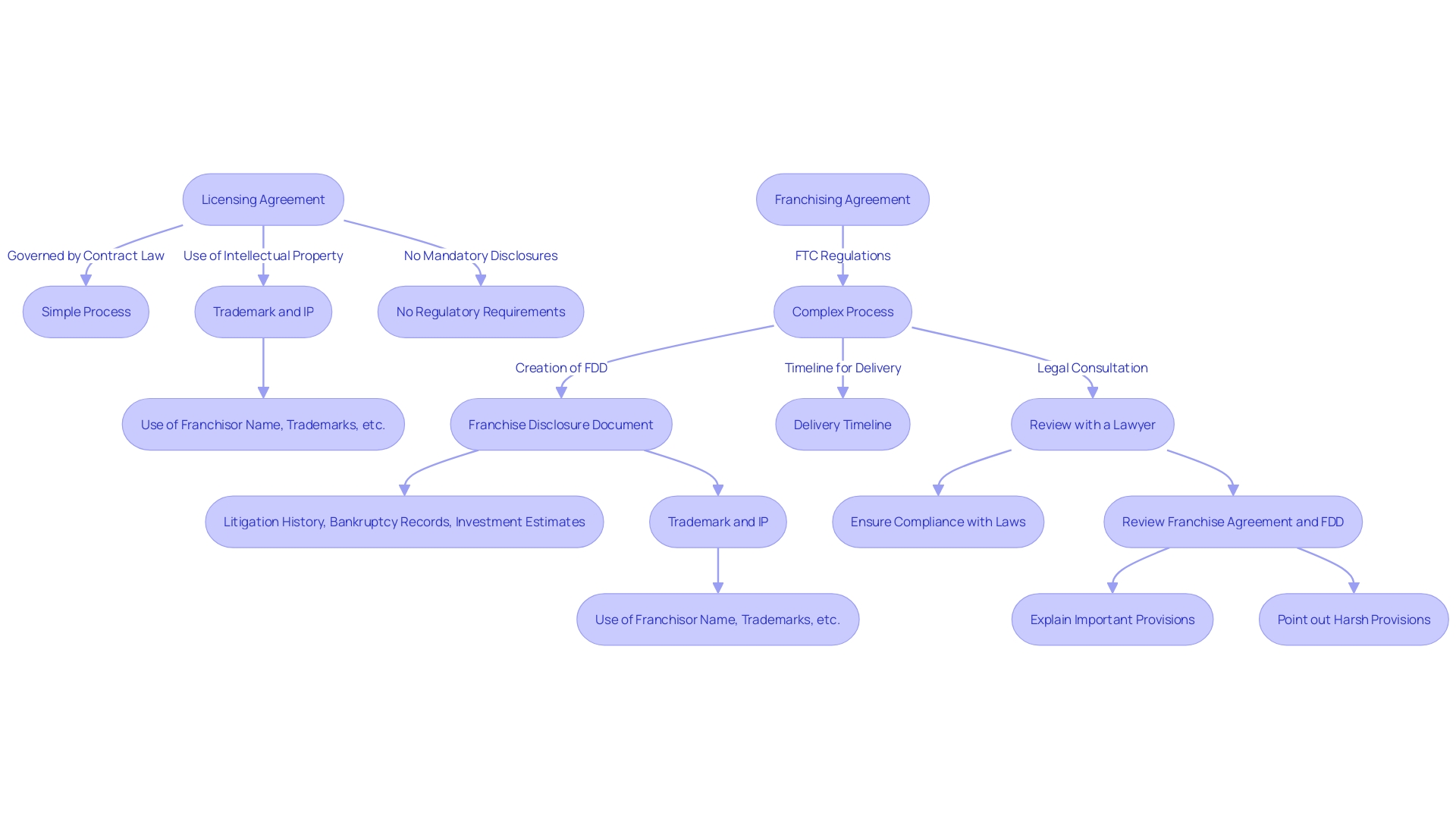
Pros and Cons of Licensing and Franchising
Licensing presents a cost-effective and flexible option for individuals aiming to capitalize on existing intellectual property with minimal investment. However, it does come with limitations, particularly in terms of control over branding and product quality. Conversely, licensing provides strong name awareness and comprehensive assistance frameworks. For instance, franchisors in the United States must comply with the FTC Franchise Rule, which mandates detailed disclosures to prospective franchisees, ensuring transparency. This comprehensive support extends to shared research and development, keeping franchisees at the forefront of market trends and innovations. Despite these advantages, operating a franchise demands a greater financial commitment and entails less operational autonomy. A notable example is the hotel industry, where collaborating with the right franchise can be crucial; the industry analysis of 91 hotel brands illustrates that while this business model offers significant support and brand strength, it also involves intricate fee structures and operational guidelines. Thus, while both licensing and business format agreements present unique benefits, they also come with their respective challenges and costs.
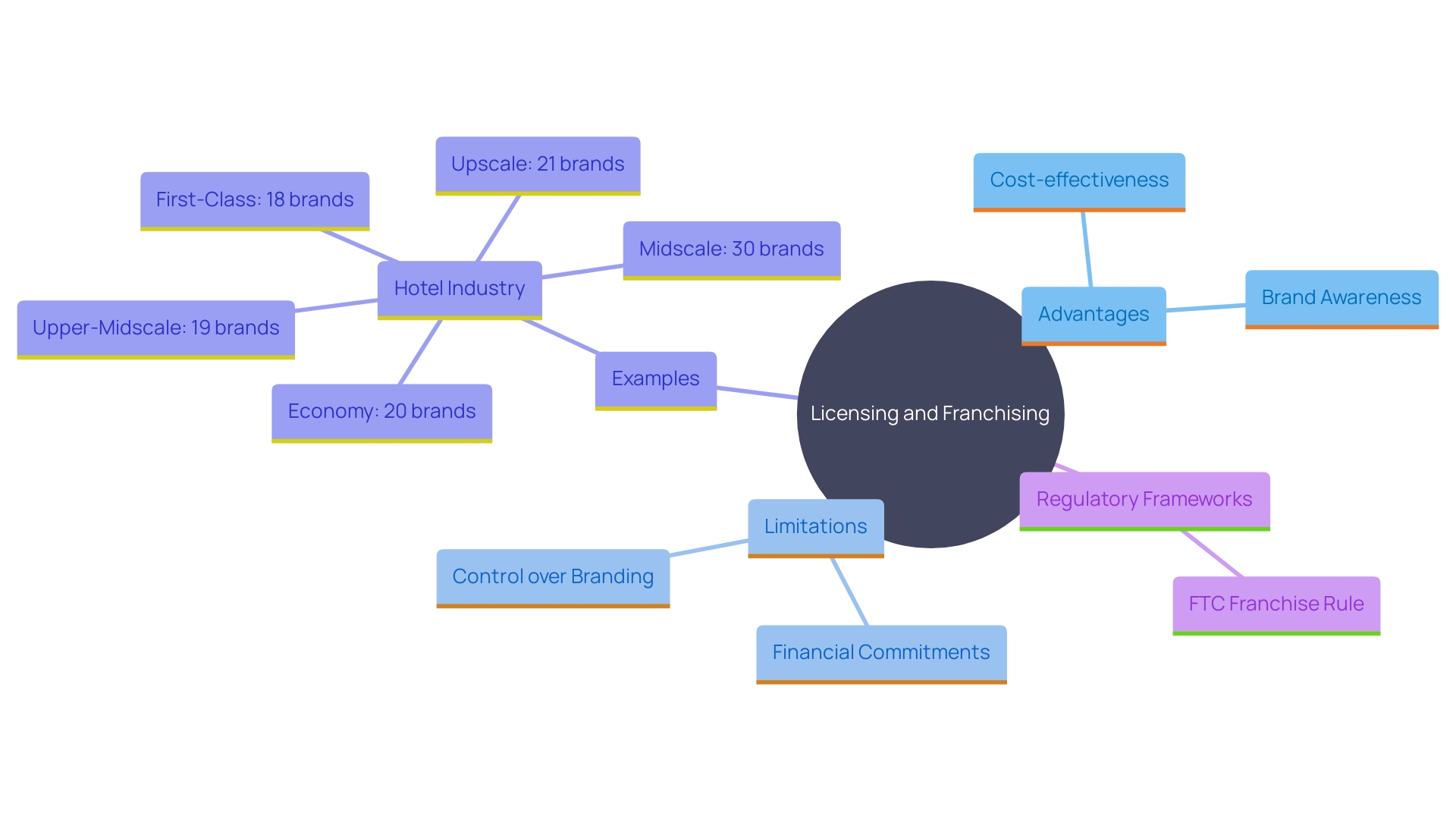
Choosing Between Licensing and Franchising
Selecting between licensing and business models requires a comprehensive assessment of your objectives, accessible resources, and the degree of control you desire to uphold. Licensing is often ideal for those who desire to run independent operations with minimal upfront investments. This model enables licensees to utilize recognized names and products while preserving operational independence, which can be especially advantageous for those with constrained funds or a desire for adaptability.
On the other hand, franchising offers a comprehensive business model complete with brand strength, operational support, and a proven track record. Franchisees benefit from economies of scale, collective research and development, and extensive training programs, which ensure they stay ahead of market trends and innovations. Elevated levels of customer satisfaction and strong feedback systems within a business network signify a dedication to ongoing enhancement, rendering this model attractive for individuals pursuing an organized and nurturing environment.
Franchising also provides significant growth potential, enabling expansion into new markets and scaling of operations. For instance, franchises in high-demand industries tend to offer faster returns on investment. Additionally, the transparency of cost structures, including initial investments and ongoing fees, helps prospective franchisees make well-informed decisions. As such, aspiring entrepreneurs who value support, brand recognition, and a structured pathway to success may find franchising to be the more advantageous option.
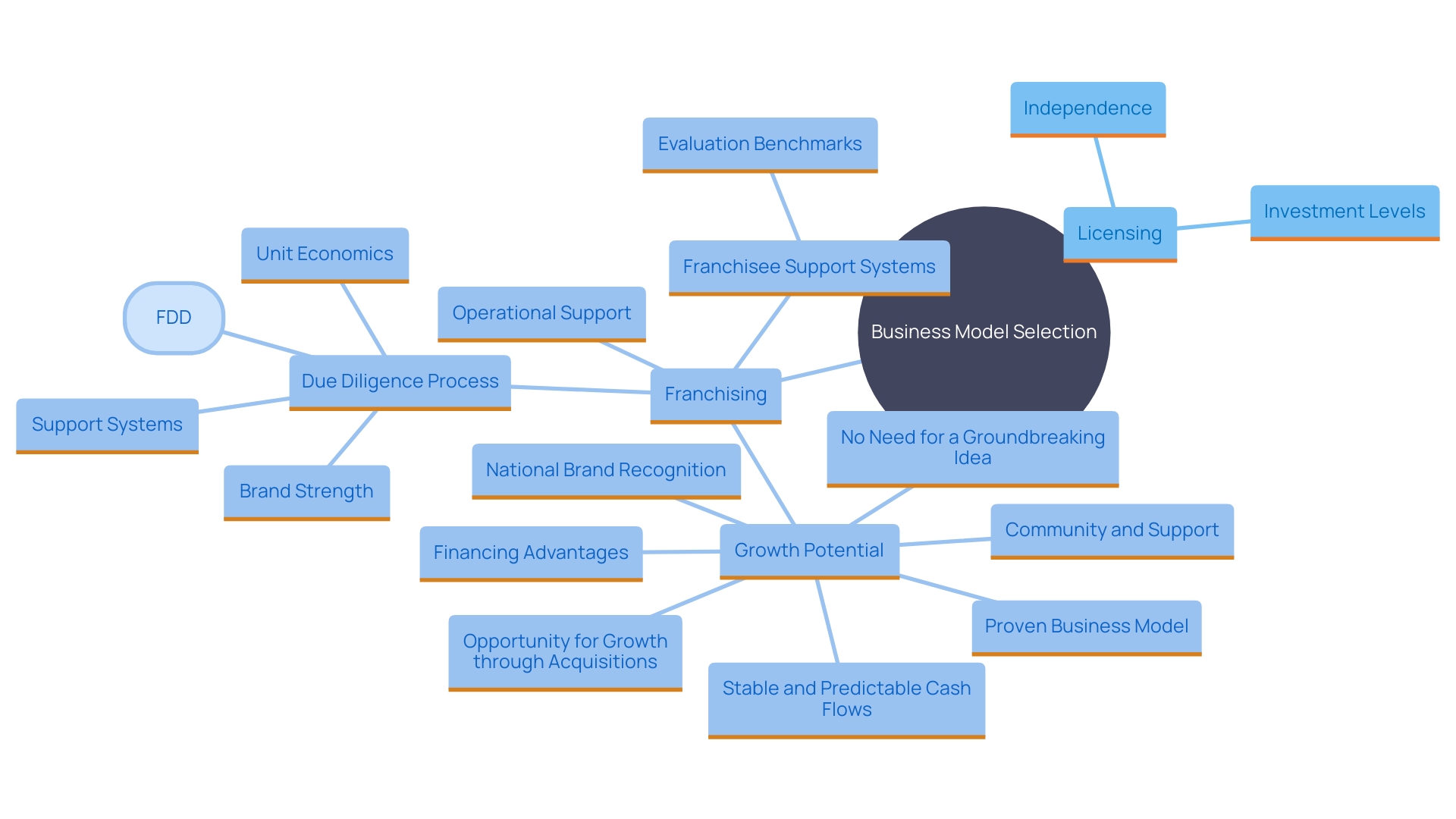
Conclusion
Understanding the distinctions between licensing and franchising is essential for entrepreneurs seeking to leverage intellectual property effectively. Licensing offers a streamlined approach, allowing businesses to utilize specific intellectual properties with minimal investment and operational oversight. This model is particularly appealing for those looking for flexibility and independence in their operations.
Conversely, franchising presents a comprehensive business framework that extends beyond mere intellectual property usage. Franchisees benefit from robust support systems, brand recognition, and economies of scale, all of which contribute to a more structured and potentially lucrative business model. However, this comes with higher financial commitments and less operational autonomy, making it crucial for potential franchisees to thoroughly assess their goals and resources.
Ultimately, the choice between licensing and franchising hinges on individual aspirations, risk tolerance, and desired levels of control. By carefully evaluating the pros and cons of each approach, entrepreneurs can position themselves for success in their chosen pathway, whether that involves the independence of licensing or the structured support of franchising.


